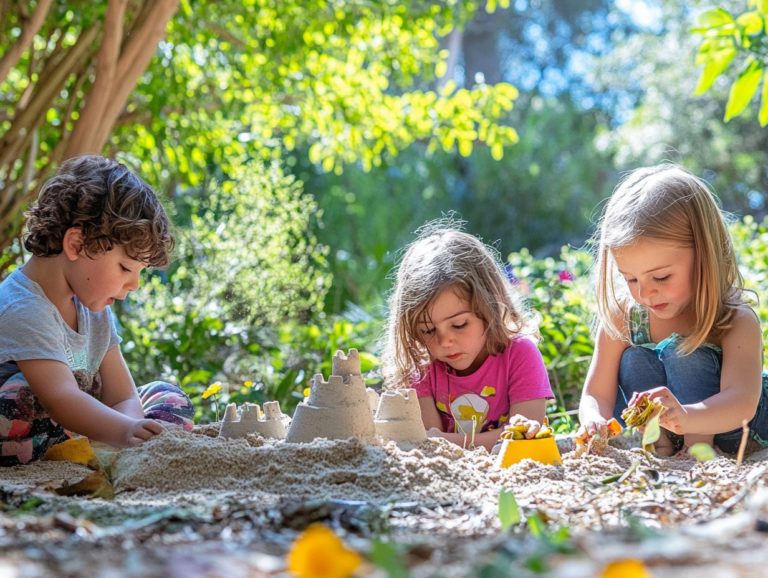How to Handle Tantrums Mindfully?
Tantrums represent a common yet challenging aspect of parenting. They often leave you feeling overwhelmed and uncertain about how to respond to your child’s emotional outbursts.
Gaining insight into the root causes of these emotional outbursts can offer valuable perspectives on your child’s emotional development and behavior.
This article delves into effective and mindful strategies for managing tantrums. These strategies range from validating emotions to establishing clear boundaries and expectations.
By embracing these techniques, you can cultivate emotional regulation and enhance your connection with your child. This approach can ultimately diminish the frequency and intensity of tantrums. Furthermore, these strategies create a safe environment and support your child’s emotional development.
Contents
- Key Takeaways:
- What are Tantrums?
- How to Handle Tantrums Mindfully?
- 1. Stay Calm and Validate Their Emotions
- 2. Use Positive Language and Empathy
- 3. Set Clear Boundaries and Consequences
- What Are the Effects of Mindful Handling of Tantrums?
- 1. Improved Emotional Regulation
- 2. Strengthened Parent-Child Relationship
- 3. Enhanced Problem-solving Skills
- When to Seek Professional Help for Tantrums
- Frequently Asked Questions
- 1. What is the first step in handling tantrums mindfully?
- 2. How can I prevent tantrums from happening?
- 3. What should I do when my child is having a tantrum?
- 4. Is it okay to ignore my child’s tantrum?
- 5. How can I teach my child to handle their own emotions?
- 6. Are there any long-term benefits to handling tantrums mindfully?
Key Takeaways:

- Validate your child’s emotions and stay calm during tantrums to avoid escalating the situation.
- Use positive language and empathy to help your child understand their feelings and learn how to express them appropriately, fostering better communication.
- Set clear boundaries and consequences, and teach coping strategies and problem-solving skills. This can help your child regulate their emotions and behavior, which may help avoid tantrums.
What are Tantrums?
Tantrums are intense emotional episodes that often arise in children, particularly during the toddler years. You might recognize them as crying, screaming, or even physical actions like throwing toys or collapsing on the floor. Such behaviors manifest from frustration and anger.
Tantrums often arise from frustration when children can’t express their needs clearly. Understanding these outbursts is crucial for parents, as they often indicate a child’s developmental phase, where emotional regulation and self-control are still a work in progress. A consistent routine helps manage these episodes effectively.
Why Do Children Have Tantrums?
Children often throw tantrums because they struggle to express their feelings clearly. This leads to frustration when their needs or expectations aren’t met. The communication barrier can leave them feeling utterly powerless as they grapple with feelings of anger, sadness, or confusion.
When expectations go unmet, these emotions can intensify. Imagine a child yearning for a toy or seeking a parent’s attention, only to be denied. This can trigger an emotional overload that feels overwhelming. As they navigate this turmoil, their still-developing emotional regulation skills make it challenging to manage their frustration. Creating a safe space can help children feel supported during these moments.
In these heightened moments, they may resort to tantrums to express their distress, sending a clear signal to caregivers that something significant requires their attention.
How to Handle Tantrums Mindfully?
To tackle tantrums mindfully, stay calm and empathetic. Create a safe environment where your child feels supported and understood. Utilizing mindfulness practices can significantly aid in this process.
Mindfulness practices can be invaluable in helping you maintain your composure. This enables you to respond thoughtfully instead of reactively in those challenging moments.
By incorporating strategies like validating your child’s feelings and promoting self-regulation, you can effectively guide them through intense emotional experiences. This not only fosters better emotional development but also helps reduce the frequency of tantrums over time. Mindfulness practices play a key role in this journey.
1. Stay Calm and Validate Their Emotions
Staying calm and validating a child’s emotions during a tantrum is essential for effective emotional regulation. By acknowledging their feelings, you can help your child feel understood, which often eases the intensity of their emotional outburst. Creating this supportive atmosphere is a game changer! Children learn to express their emotions more constructively and begin to self-regulate. Help each other calm down by practicing calmness together.
To elevate this approach, consider incorporating techniques such as deep breathing exercises or mindfulness practices into your routine. For example, when a tantrum occurs, taking slow, deliberate breaths together can ground you and provide your child with a visible model of calmness and self-control. Regular practice of mindfulness teaches your child to be present with their emotions, recognizing them without judgment. This validation nurtures emotional awareness and instills the belief that it s okay to feel what they re feeling.
Over time, these strategies significantly support your child in developing a healthier relationship with their emotions. This ongoing practice establishes a routine that benefits emotional regulation.
2. Use Positive Language and Empathy
Utilizing positive language and empathy is crucial when guiding children through their tantrums, as it provides them with the support they need while learning healthy ways to express their emotions. Embracing empathetic communication helps your child better understand their feelings and encourages them to articulate their needs more effectively.
This approach creates a nurturing environment, allowing children to feel safe while exploring their emotions rather than succumbing to outbursts. For example, instead of saying, “Stop crying!“, you might consider saying, “I see that you’re really upset. It’s perfectly okay to feel that way. Let s talk about what s bothering you.” Such phrases not only validate your child’s feelings but also redirect their focus from the tantrum to collaboratively finding a solution. In this way, you maintain calm and promote positive behavior.
Engaging in this kind of dialogue not only helps defuse immediate distress but also equips children with valuable tools to communicate their emotional experiences more constructively in the future. This is a critical communication strategy.
3. Set Clear Boundaries and Consequences

Establishing clear boundaries and consequences is essential for helping children grasp acceptable behavior, particularly when tantrums stem from unmet expectations. Setting rules and consequences from the outset cultivates a structured environment that encourages self-regulation and diminishes confusion during emotional upheavals. This also aids in understanding the triggers that lead to emotional outbursts.
When children understand what is expected of them and the repercussions of their actions, they are more likely to develop a sense of responsibility and accountability. This predictability enables them to navigate their emotions better, significantly reducing the chances of tantrums caused by uncertainty. Consistent practice of these rules helps build emotional stability.
By consistently enforcing these boundaries, you reinforce positive behavior and guide children in managing their feelings appropriately. As they start to recognize the link between their actions and the resulting consequences, they gradually cultivate a sense of safety and security in their environment, fostering lasting emotional stability.
Start today by choosing one strategy to help your child handle their emotions more effectively!
4. Teach Your Child Coping Strategies and Problem-Solving Skills
Teaching your child coping strategies and problem-solving skills equips them with the essential tools to navigate their emotions. This significantly reduces the chances of tantrums in the future. By introducing techniques like deep breathing, mindfulness practices, and alternative methods of expression, you can foster better emotional regulation in your child.
These strategies not only promote a calm and focused mindset, but they also enable your child to recognize their feelings. This helps them articulate their emotions appropriately. For instance, using visual aids such as emotion charts can help them identify what they are experiencing. This makes it easier for them to voice their needs rather than resorting to outbursts.
Engaging in role-playing scenarios allows them to practice problem-solving and decision-making, reinforcing their ability to handle stressful situations effectively. With your consistent encouragement and guidance in these coping mechanisms, your child can build resilience. This lays a solid foundation for emotional intelligence that will serve them well throughout their lives.
Introducing these strategies as part of your daily routine can be particularly effective.
5. Model Mindful Behavior and Self-Regulation
Modeling mindful behavior and self-regulation is a powerful strategy for you as a parent to teach your children how to effectively manage their emotions. By demonstrating calm reactions in stressful situations, you can significantly influence how your children respond. This underscores the importance of mindfulness in your daily interactions.
This practice also helps in sharing emotions effectively. For instance, when faced with a challenging situation, such as a disagreement or an unexpected change, you can employ deep breathing techniques to maintain your composure. This approach sets a powerful example that your children will remember!
In moments of heightened anxiety, encouraging your children to express their feelings while you model active listening fosters an open dialogue about emotions. Practicing gratitude together, like sharing what you appreciate at the end of the day, can instill mindfulness. This promotes reflection and emotional awareness in their lives. These techniques are crucial to creating a mindful family environment.
6. Seek Professional Help if Needed
If tantrums are becoming a frequent or intense occurrence in your household, seeking professional help can be an invaluable step toward gaining essential support and strategies for both you and your child. A trained professional can assess the underlying causes of those emotional outbursts. They will provide you with tailored strategies that promote healthier emotional regulation and coping mechanisms.
This step is vital for parents who want to understand and improve their child’s behavior. Recognizing the signs of tantrums is crucial; you might notice difficulties in managing frustrations, prolonged anger over trivial matters, or challenges when transitioning between activities.
Understanding the various types of support available can be incredibly beneficial for parents facing these common issues. Consider options like behavioral therapy, which focuses on providing coping skills and behavior management techniques. You might also explore family counseling that fosters open communication and understanding of children’s emotions.
Support groups can also be an excellent choice for parents like you who want to connect with others facing similar challenges. This allows you to share experiences, validate your feelings, and explore solutions in a supportive environment. With professional guidance, you can enable your family to establish healthier emotional responses and improve your daily interactions.
What Are the Effects of Mindful Handling of Tantrums?
Mindfully managing tantrums can profoundly impact a child’s emotional development and enrich the parent-child relationship. By embracing mindful practices and implementing effective strategies, you can nurture your child’s emotional regulation. This results in fewer tantrums and improved communication skills as they grow.
Are you ready to transform your child’s emotional well-being today?
1. Improved Emotional Regulation
Improved emotional regulation stands out as one of the primary benefits of handling tantrums with mindfulness. It equips you with the skills necessary to manage emotions effectively. By embracing mindfulness and ways to manage your own feelings, you learn to recognize your feelings and respond to them in constructive ways, creating a safe space for emotional expression.
This ability results in fewer outbursts and nurtures a sense of resilience and adaptability in various situations. As you become more skilled at navigating your emotional landscape, you re likely to develop healthier relationships with peers and adults. This is crucial for your social development and overall well-being.
The practice of mindfulness helps you cultivate a more positive mindset, enhancing your focus and academic performance. Ultimately, by integrating these emotional regulation techniques and mindful practices into your daily life, you can build a strong foundation for lifelong emotional intelligence and improve your overall behavior in diverse circumstances.
2. Strengthened Parent-Child Relationship

Mindfully managing tantrums can truly enhance your parent-child relationship, transforming challenging moments into opportunities for open communication and emotional support. When you respond with empathy and understanding, you cultivate trust and connection, making your child feel secure and valued while co-regulating their emotions.
Positive interactions provide a valuable opportunity to teach your child about emotions and coping strategies, reinforcing the idea that it’s perfectly okay to express their feelings. Engaging in calm conversations during or after a tantrum allows your child to process their emotions, while you model appropriate responses and validate their experiences.
By being present and attentive, you validate your child’s experience and show them that their feelings matter. This approach not only reduces the frequency and intensity of future outbursts but also deepens your relational bonds, setting the stage for healthier communication and emotional development as your child continues to grow.
3. Enhanced Problem-solving Skills
Imagine your child confidently solving problems! Effectively managing tantrums can significantly enhance your child’s problem-solving skills. As they navigate their emotions, they learn to identify constructive solutions to their challenges. How can managing tantrums boost this vital skill? By equipping them with strategies that promote emotional awareness and self-regulation, you can guide them in developing their own problem-solving abilities during those emotional outbursts.
When you remain calm and supportive, you create an environment where your child feels safe to express their feelings. This nurturing atmosphere encourages open communication and fosters resilience, helping them grasp the importance of emotional regulation and understand their feelings more deeply.
As they learn to cope with frustration and anger, your child develops essential techniques for managing their emotions, like deep breathing or counting to ten. These coping strategies refine their immediate emotional responses and establish a solid foundation for healthier decision-making and emotional regulation in the future.
Ultimately, this mindful approach to tantrums equips them with invaluable life skills that significantly contribute to their overall emotional development and positive behaviors.
In conclusion, practicing mindfulness in handling tantrums is vital for both parents and children. It strengthens their bond and fosters emotional growth. Parents are encouraged to embrace mindfulness techniques for handling tantrums in their daily lives to cultivate a nurturing environment that supports emotional intelligence and resilience.
4. Reduced Frequency and Intensity of Tantrums
One of the most striking benefits of mindfully addressing tantrums is the noticeable decrease in both their frequency and intensity. Teach emotional regulation techniques. Foster a supportive environment to reduce tantrums.
For example, introducing deep breathing exercises or a time-out can enable your child to pause and evaluate their feelings before reacting impulsively. Visualization techniques, where they imagine a peaceful place to help calm down, can also be effective in soothing their minds during stressful situations. Engaging in regular conversations about feelings helps them recognize and articulate their emotions, which is essential for their emotional development.
This proactive approach builds a strong foundation for understanding and managing feelings, thus minimizing the triggers that often lead to tantrums. Over time, these strategies cultivate resilience, enabling your child to face challenges with greater ease and fostering a clear understanding of their emotions.
When to Seek Professional Help for Tantrums
Understanding when to seek professional assistance for tantrums is essential, as ongoing emotional outbursts may signal deeper behavioral concerns demanding expert attention. Assess the environment and your child’s behavior to determine the best approach.
Observe your child’s behavior and emotional regulation closely to assess whether professional support is warranted, especially if tantrums disrupt daily life or hinder their development. Addressing any behavioral issues promptly and effectively is crucial.
1. If Tantrums Persist Beyond a Certain Age
If tantrums continue beyond the typical age for these emotional outbursts, it may signal a need for additional support in your child’s emotional development. Generally, tantrums are most prevalent in toddlers and preschoolers, ages 1 to 4, as they navigate the complexities of self-control and communication. Establish routines and clear expectations to help mitigate these outbursts.
When these emotional responses persist beyond this developmental period, they might indicate challenges in managing emotions, social interactions, or even potential underlying behavioral issues. Understanding the reasons behind these prolonged tantrums is essential, as they can impact not only your child’s social relationships but also their academic performance and overall well-being.
Creating a safe environment is key in identifying and addressing these issues. Recognizing these patterns early allows you, as a caregiver or educator, to implement effective strategies and interventions that foster your child’s emotional resilience and promote healthier coping mechanisms.
This proactive step can dramatically boost your child s ability to handle their feelings and behavior over time.
2. If Tantrums Are Causing Harm to the Child or Others
When tantrums escalate to a point of harm, whether to the child or those around them, it’s crucial to get professional help immediately to effectively address the underlying behavioral issues. Professional support can offer strategies to ensure a safe environment for everyone involved.
Ignoring these outbursts can intensify the situation, creating a cycle of escalating incidents that can be quite challenging for you as a parent or caregiver to manage. Support systems, such as therapists and behavior management programs, play a vital role in equipping you with strategies that promote emotional regulation and minimize the frequency of explosive behaviors.
By intervening early, you can guide the child toward healthier ways of expressing their emotions, ultimately fostering a more harmonious and stress-free environment. This proper guidance not only enables the child but also alleviates stress for everyone involved, significantly enhancing the overall dynamics of your family and improving the child’s emotional regulation.
Understanding Tantrums and Behavioral Issues

When tantrums are frequently accompanied by other behavioral concerns, it s wise to seek professional assistance. This step can offer valuable insights into how your child manages their emotions and coping strategies, ensuring they receive the support they need to thrive.
These behaviors like aggression, withdrawal, or social interaction difficulties often signal underlying emotional distress or an inability to process feelings effectively. By obtaining a detailed evaluation, you ll gain a clearer understanding of your child s unique needs. This understanding enables you to tailor support strategies that promote growth and emotional well-being.
Professionals are adept at identifying patterns and triggers that may elude your notice. They can guide you toward effective interventions and techniques to manage these behaviors.
Starting early can help your child manage emotions better, ultimately leading to improved behavior and social skills, as well as a healthier emotional landscape throughout their development. This proactive approach ensures that children learn to regulate their emotions effectively.
Frequently Asked Questions
1. What is the first step in handling tantrums mindfully?
The first step is to remain calm and acknowledge your own emotions. Take a deep breath, practice mindfulness, and remind yourself to respond, not react, to your child’s tantrum.
2. How can I prevent tantrums from happening?
One way to prevent tantrums is to establish a routine and stick to it. Children thrive on predictability, and knowing what to expect can help reduce the likelihood of tantrums. Implementing clear expectations and consistent routines can foster a sense of control and stability.
3. What should I do when my child is having a tantrum?
When your child is having a tantrum, try to stay present and observe their behavior without judgment. This can help you understand the root cause of their tantrum and respond appropriately. Practice mindfulness and remain calm to create a safe environment for your child to express their feelings.
4. Is it okay to ignore my child’s tantrum?
Ignoring a tantrum is not always the best approach, as it can make the child feel unheard and escalate the situation. Instead, try to acknowledge their feelings and offer solutions or distractions to help them calm down. Validate their frustration and use techniques like redirecting their attention to avoid tantrums.
5. How can I teach my child to handle their own emotions?
One way to teach children how to handle their emotions is to model mindfulness and regulate your own emotions in front of them. This can show them healthy ways to cope with difficult feelings. Practice mindfulness regularly and establish routines to help children manage their behaviors and develop emotional regulation.
6. Are there any long-term benefits to handling tantrums mindfully?
Yes, handling tantrums mindfully can help strengthen the parent-child relationship, improve communication, and teach children how to regulate their emotions. It can also create a more peaceful and positive environment at home. By practicing co-regulation and supporting each other’s emotional development, families can develop better understanding and stress management strategies.
Taking proactive steps now can lead to amazing improvements in your child s emotional skills!






